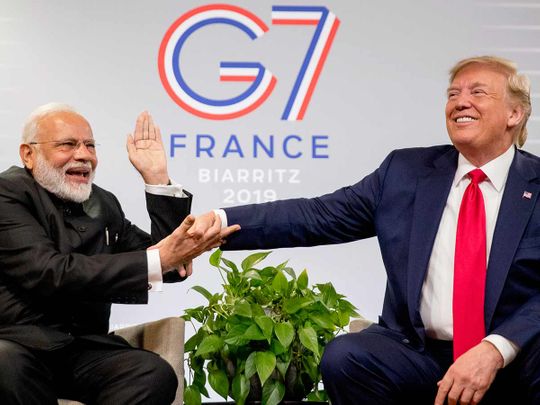
Americans are going to vote on 3 November 2020 to elect their next President. In the last days before the election, Democratic challenger Joe Biden is leading Donald Trump in the national polls and is expected to win the race unless there is a repeat of the 2016 surprise. The anticipated loss of Trump is being seen by many to be bad news for the leaders like Vladimir Putin of Russia, Kim Jong-un of North Korea, and Recep Erdogan of Turkey. Even more than his these three personal friends, India’s Prime Minister Narendra Modi has put a huge amount of his political capital to support Trump in this election, and he has a lot to worry about if Trump fails to win back the White House.
There are 1.2 million Indian-origin American voters. More than a year before the US election, Modi had travelled to Houston, Texas, and shared the stage with Trump in a huge diaspora event. There he gave a call ‘Ab ki baar, Trump sarkar’ to his supporters, which was an alteration of his campaign slogan, and that phrase means, ‘This time it is the turn of the Trump Administration’. This was not only an open interference in the American election by a foreign leader but also it broke India’s long-standing foreign policy of remaining bipartisan at the time of US elections. The Trump camp even released a video at the Republican National Convention a year later, which also claimed Modi’s ‘Ab ki baar, Trump sarkar’ call as an endorsement of Trump.
As if the ‘Howdy Modi’ event in Houston in September 2019 was not sufficient enough, Modi ignored the impending Covid crisis and invited Trump and his family to India and organised a massive ‘Namaste Trump’ rally in Ahmedabad, Gujarat for him in the last week of February 2020. This was not only for Trump to show to American voters his global popularity but also to give a strong message to Indian origin voters in the USA to support Trump in the election.
Self-admiring populists
Besides Modi’s open endorsements, the Modi-supporting Hindutva organisations in the US, the Overseas Friends of BJP-USA and US-HSS (Hindu Swayamsevak Sangh, the overseas counterpart of the RSS) are at the forefront of supporting and contributing to Trump in the election. It is important to ask why are Modi and his supporters want Trump to win again? Modi and Trump are also both self-admiring populists and they openly boast about their close friendship. However, this ‘friendship’ is very much transactional and primarily for their interests.
The US-India relationship has been on the upswing for more than two decades and the Modi-Trump chemistry does not have any contribution to it. Rather, Trump has ended preferential trade treatment for India and has not agreed to a new trade deal. He has been openly and repeatedly bracketing India with China for not doing enough on climate change. Trump has also suspended the H1-B visa, the US visa program which had benefited India the most.
Reversing the trend started by previous administrations, Trump in his South Asia policy has even started to bracketing India with Pakistan. In early 2019, when India and Pakistan tension was at its peak, he refused to take anyone’s side and even wanted to mediate the Kashmir issue, which was completely against India’s stated policy. While he has been direct and vicious in his attacks on China on many other issues, Trump has not said anything condemning China’s recent intrusion to Indian territory, rather has again expressed his desire to be a mediator.
Even Trump has not given a state dinner to Modi at the White House, which he has done for Emmanuel Macron of France and Scott Morrison of Australia. In comparison, Dr. Manmohan Singh was the first foreign leader to be invited to the state dinner in the Obama White House. The only thing Trump has done for Modi, besides calling him a great friend a few times is that his administration has remained completely silent on the plight of minorities in India and erosion of political rights in Kashmir.
‘Militant religious outfits’
Trump administration has not taken the Modi regime to the task even though the US Commission on International Religious Freedom has been scathing in its recent reports about the deteriorating religious freedom in India. The CIA classification of two RSS affiliated organisations as ‘militant religious outfits’ in 2018 has not been able to motivate the Trump administration to question the Modi government for promoting Hindu majoritarianism. Trump remains unmoved on the political repression in Kashmir despite bipartisan criticism of Indian actions by the US lawmakers.
Kamala Harris, in the context of human rights abuse in Kashmir said last year “abusers will convince those they abuse that nobody cares, and nobody watching and nobody pays attention, which is a tool of an abuser.” Modi is perhaps right to fear that in a Biden administration, his regime will be taken to task on human rights issues. For a Democratic President, it will be impossible to ignore as there will be a huge internal pressure within the party to take a stance. The inclusion of Kamala Harris in the Democratic ticket has left no doubt in Modi’s mind that he will not be able to get a free pass as he has been for the last four years. The collapsing Indian economy may further limit Modi’s bargaining options.
Trump’s defeat will not be in any way an impediment to the India-US relationship, rather it will be normal again and be based on strategic partnership and mutual respect and not being subjected to the whims of an unpredictable President. At the same time, under the Biden administration, Modi is likely to face international censure. The change in the White House will surely force Modi to walk a tightrope when it comes to the treatment of minorities at home.
Ashok Swain is a Professor of Peace and Conflict Research, Uppsala University, Sweden.







